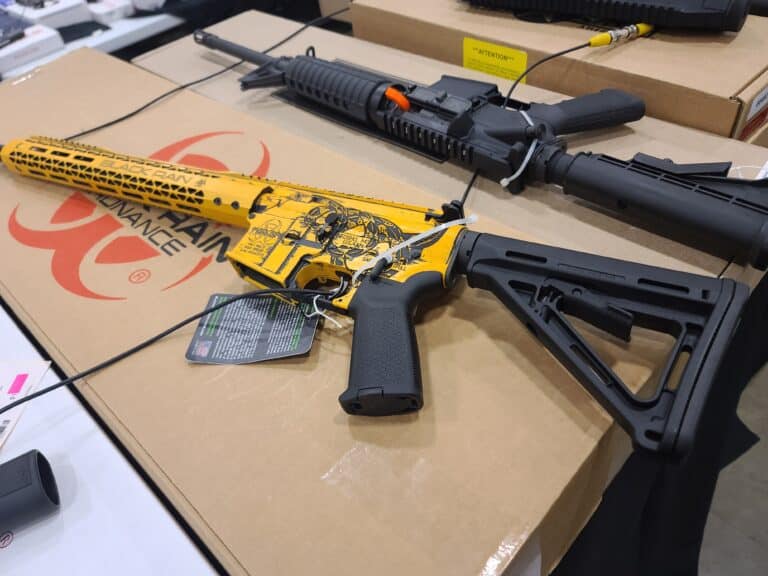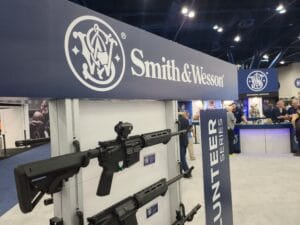The Prairie State’s ban on selling AR-15s and similar firearms is back in effect.
In a four-to-three vote handed down Friday, the Illinois Supreme Court reversed a lower court ruling that struck down the Protect Illinois Communities Act (PICA). It found the lower court was wrong to block the law on equal protection grounds. However, it also refused to consider whether the ban on the popular firearms violated the Second Amendment.
“The record demonstrates plaintiffs omitted a stand-alone second amendment claim from the complaint and expressly disclaimed it in the circuit court, resulting in waiver,” Justice Elizabeth Rochford (D.) wrote for the majority in Caulkins v. Pritzker. “Allowing plaintiffs to argue a novel theory that was neither pleaded nor argued below would prejudice defendants and amount to improper advocacy on plaintiffs’ behalf. Plaintiffs chose not to present their case to the circuit court in second amendment terms, and we hold them to their decision.”
The ruling effectively resets the state case against the so-called assault weapons ban. By rejecting the equal protection arguments while not ruling on the Second Amendment claims, gun-rights advocates will be forced to start a new case if they want those grounds to be considered. That process could take months or years to bear fruit for activists.
The Supreme Court’s decision comes after state Judge Joshua Morrison blocked the law on both equal protection and Second Amendment grounds.
“The Court finds the Plaintiffs have shown a likelihood of success in relation to the equal protection clause of the Illinois Constitution and that the Defendant’s use of criteria, especially those that is not evenly applied violates the face of the Supreme Court’s findings in New York State Rifle Association, Inc v. Bruen [SIC],” Judge Morrison wrote in January.
He found the law was an ongoing danger to the Illinois residents who filed the case.
“Plaintiffs are being immediately and irreparably harmed each day in which their fundamental right to bear arms is being denied and that this harm is continuing in nature,” he wrote.
The state Supreme Court disagreed. The majority found the plaintiffs, who wish to buy the banned guns in the future, were not similarly situated to those exempt from the ban.
“[W]e hold the circuit court erroneously entered summary judgment for plaintiffs on their equal protection and special legislation claims,” Justice Rochford wrote. “Plaintiffs are not similarly situated to the trained professionals. To the extent plaintiffs claim they possess restricted items, they are not treated differently from the grandfathered individuals. To the extent plaintiffs claim they do not possess restricted items, they are dissimilar to the grandfathered individuals, who have a reliance interest in retaining them.”
In April, U.S. District Judge Stephen P. McGlynn also ruled the state’s ban violates the Second Amendment.
“Can the senseless crimes of a relative few be so despicable to justify the infringement of the constitutional rights of law-abiding individuals in hopes that such crimes will then abate or, at least, not be as horrific?” Judge McGlynn wrote in Barnett v. Raoul. “More specifically, can PICA be harmonized with the Second Amendment of the United States Constitution and with Bruen? That is the issue before this Court. The simple answer at this stage in the proceedings is ‘likely no.'”
His ruling has since been stayed by the Seventh Circuit Court of Appeals, which began oral arguments in June. The Supreme Court has yet to intervene in this case but rejected an emergency injunction request in a similar case out of Naperville, Illinois.
The Illinois Supreme Court’s decision to undo the lower court ruling puts the law back into effect. But the decision to sidestep any Second Amendment claims leaves the issue on the table for future cases.
“Ascertaining whether the restrictions unconstitutionally infringe on the public’s right to keep and bear arms requires consideration of whether the regulated items are bearable arms that are commonly used for self-defense and whether the regulations are consistent with this nation’s historical traditions. Unsurprisingly, the record contains no evidence—beyond news articles—relevant to these questions because plaintiffs never raised them in the circuit court. Even if the complaint alleged a second amendment claim, the record does not support affirming the judgment on that basis. As plaintiffs expressly disclaimed a second amendment claim below, we offer no opinion on the potential viability of such a claim.”
The four-to-three vote saw Democrat Mary O’Brien join the two Republican members of the Court in dissenting on the decision.






